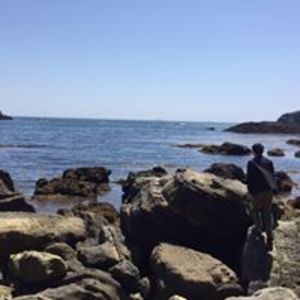
工作經歷
將群智權集團(台北), 專利工程師, Jan 2020 ~ present
中美台專利答辯,翻譯,新案撰寫。
新時達機器人(上海), 機器人軟件開發工程師, Mar 2015 ~ Dec 2015
視覺功能集成系統開發. 工件識別算匹配算法設計, 實作, 測試.
軟件架構設計與實作
相機標定與標定板識別算法改進.
TCP/IP服務端與客戶端接口設計實作.
客戶端Windows MFC GUI.
Codesys工程修改. 上機測試實驗.
原創奈米科技(台北) , 工程師, Feb 2012 ~ Aug 2012
手勢偵測系統評估與架設. 媒體播放程式撰寫與修改.
學歷
國立臺灣大學(肆業), 哲學博士(PhD), Physics, 2017 ~ 2019

Texas A&M University(美國) 肆業, 哲學博士(PhD), Materials Science & Engineering, 2013 ~ 2014
Molecular dynamics simulation of microtubles using CHARMM.

國立臺灣大學, 科學碩士(MS), 物理, 2008 ~ 2011
Simulation of classical Coulomb gas and its mathematical analysis.

國立臺灣大學, 理學士(BS), 物理, 2004 ~ 2007
GPA 3.5

Biography
I've been fascinated by science since childhood. At 14, I started learning Java programming and became a Sun certified Java programmer. In high school, I earned the silver medal in the Asian Physics Olympiad, and spent most of my time discussing computer algorithms with my friends; I studied in Tsinghua University for one year, then transferred to National Taiwan University. After military service, I earned my master's degree in physics at NTU working on simulations of Coulomb gas.
Then I began working at UNII instruments, during which my responsibilities include setting up a 3D stereo vision system for gesture tracking, algorithm development, optimization of rendering and software interface coding. It was a completely new field to me but I had the leisure to study the OpenCV textbook and implement the algorithms, while using my knowledge at shader programming and arduino to help accelerate the proprietary rendering software, and help my colleague automate optical measurements. I left the job because the career prospects didn't look good (due to incompetent management and the financial prospect of the company).
Later I tried to do a PhD in Texas in the biological materials field, however the field wasn't what I thought it would be, and my financial funding would only last for one year. During the summer vacation I traveled in China and it seemed that living in China would be a lot more interesting than living in the countryside of Texas for another 4 years, so I decided to quit PhD, and found a job in Shanghai.
In STEP robotics I continued to do computer vision, there were a few CV related projects but I was tasked to integrate them, from scratch up build a module that would provide similar functionality, and would be run as a TCP/IP server. It was a new project and nobody else was assigned to the job, so I had to implement the server/client and design the protocols, interface the camera driver, calibrate the lenses, and design algorithms to pick up specifically shaped objects from the assembly line. At that time, deep learning hasn't been invented, and the image segmentation and background filtering algorithm proved too much for me to digest. In the end I developed my own algorithm which worked more than 99% of the time in lab tests based on image contours, and benchmarked the functions to figure out the performance bottlenecks, so that the whole algorithm could run on the already burdened industrial computer. In the end the system is usable but everybody else was focusing on other more urgent projects, the manager asked me what my next project should be, should it be text recognition? I said I've had enough, this wasn't interesting at all.
I came back to Taiwan, started setting up my mushroom lab, and learned online how to clone mushrooms and grow them. I have more than 50 species and successfully fruited about 15. Some of which are really beautiful. I enjoy doing experiments at home as my hobby, including building a HHO gas generator, synthesizing ferrofluid using the co-precipitation or hydrothermal route, tuning my solid state Tesla coil, and writing firmware on microprocessors to control my mushroom incubator. I also wrote a clone for Minecraft, it features dynamically loaded terrain and ray-traced rendering using shaders and OpenGL.
What I'm interested is a job that I could combine my skills in physics & programming with the resources to build something innovative or disruptive. I'm not sure if I'll regret not working at Google or Facebook in the USA despite having the chance to get an interview. They live a good life but they're not doing anything fascinating. Even as a programmer at Google you may by chance get to work with a new radar system, but you'll only get tasked to work on the UI and control interface, which isn't any more fascinating than designing a website. My hobbies also include 圍棋, piano, and reading technology news (phys.org/technologyreview.com).
了解詳情